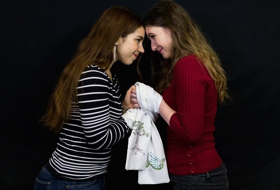Review: GALLATHEA Brings Happiness All Around At Gamut

By now, most of us know that public Elizabethan theatrics were all-male, with boys taking women's roles. We don't do that with Shakespeare any more, now that we're no longer scandalized by women on the stage. Shakespeare made much of the concept, though, in such plays as TWELFTH NIGHT, in which teen boys played women obliged to disguise themselves as men. He certainly wasn't the first playwright to do so. Not the first, but before Shakespeare, there was John Lyly, who produced GALLATHEA . Not related to the classical story of Galatea, the sculpture (that one became Shaw's PYGMALION and then MY FAIR LADY), it's still a classical story of sorts, and one that Lyly saw fit to present to Elizabeth I on New Year's Day, 1588.
The comedy, which has enough material for an entire semester of a women's studies class hidden in it, isn't performed as often as it should be, though it is in production right now as part of the Stage Door Series at Gamut Theatre in Harrisburg, directed by Francesca Amendolia and with original music by Edward Webb. Amendolia has made several wise edits to the original version, shortening it slightly and eliminating several unnecessary characters, while having performed quite successfully in contemporary dress.
Certain moments of that contemporary dress are completely and wonderfully perfect, such as having the goddess Diana's nymphs, young virgins roaming the forests with her, played by young adults with Girl Scout uniforms - what other group of young ladies do we expect to see running in a pack through the woods today? Jeff Wasileski's Neptune, god of the seas, appears in nautical dress. And Meredith Greene, a spectacular, temperamental Diana, is appropriately all black and silver. On the other hand, Venus, played by Dana Kinsey, is the picture of seduction in a slinky red evening dress.
But it's Gallathea, Sarah Dugan, and Phillida, played by Emily Hofstaedter, who are at the center of the story, thanks to Neptune. The god has plagued a village in Lincolnshire for beautiful virgin sacrifices to Neptune's pet monster, and so the fathers of the two most beautiful virgins in the village have disguised their daughters as young men and sent them to hide in the woods. Unlike TWELFTH NIGHT, in which a woman disguised as a man is in love with someone definitely a man, both of the girls fall in love with each other being perfectly certain that the other one is male, when neither is. This added level of complexity doesn't seem to have bothered Queen Elizabeth, and it shouldn't come as a surprise to modern audiences. What is surprising for its period is that the comedic happy ending leaves the heroines on stage together, completely unwilling to part after discovering that they are indeed both women. Perhaps Venus has been socializing with Diana a bit too much, because she informs everyone that everything's pretty much fine. (Sure, she admits, one of them might wind up being male one of these days, but she's not too bothered about which one, or when or if it may happen.)
A less central but marvelous character is Hebe, the substitute virgin sacrifice, here played by Fran Bixby and voted by many audience members at the opening talkback as their new hero. Hebe manages to stretch out her life by an unending series of "but wait!" comments, including a monologue clearly intended to satisfy the Queen's vision of herself as the Virgin Queen, and is the "smart girl" character of the play. She also, equally intelligently, lives. GALLATHEA does not follow the formulaic rules of the modern horror movie - everyone lives, the monster is retired, and all is right with the world, at least in Lincolnshire.
The performances are unanimously fine, including all of the younger performers, although Jeff Wasileski does present a particularly imposing figure as the demanding Neptune, and Greene's Diana is one not to be trifled with (especially by Seth Winnick's Cupid, who's a bit of a preteen troublemaker.)
Amendolia's touches of business for the show are delightful, particularly when the nymphs are loose. Left to their own devices they play such things as hopscotch and "Diana says," while, when Venus' difficult young son Cupid pranks them, they turn to writing bad poetry and browsing through teen heartthrob magazines. Come for the story; stay for the nymphs, who are more fun to watch than the high school girls' party in GREASE any day. Lyly didn't think much of giving stage direction, so whatever nymphs did in 1588, they're certainly a fun bunch here.
At Gamut Theatre through the 21st. Come as you are, pay what you will, no reservations needed. The show is in the first floor lounge, with seating around the staging - expect nymphs to be traipsing right past you, wherever you sit. Information on Gamut's Facebook page and at their webpage, www.gamuttheatre.org.
Reader Reviews
Videos

